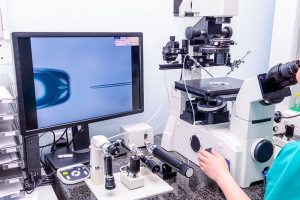Vitamin D is involved in various stages of conception and maintaining a pregnancy and can affect the outcome of fertility treatments.
Calcitriol, or D3, is the active form of this vitamin that is used most by the body. There are two ways in which the body can acquire D3. First, our bodies produce it following exposure to certain types of sunlight. Secondly, it can be found in certain foods and dietary supplements. This vitamin is vital to many bodily functions.
How the Body Uses Vitamin D

This vitamin is also vital to the normal functioning of the immune and reproductive systems. It performs like a hormone by controlling the body’s natural and acquired immune responses. It also has many receptors in the female organs, including the uterus and ovaries. Calcitriol has been found to influence the genes responsible for estrogen production and is active during several stages of conception and pregnancy.
The Effects of Deficiency on the Body
Due to the variety of functions performed by D3, there are also several problems that can result from its deficiency. Because it regulates calcium and phosphorus absorption, low levels can cause weak bones, or rickets, in children as well as fragile bones in adults. Because of the role D3 plays in the functioning of the immune system, deficiency can also be linked to the development of certain diseases, autoimmune disorders, and cancers.
There are several ways in which D3 affects the processes of conception and pregnancy maintenance and, therefore, deficiency can have adverse effects. D3 is involved in the process of inducing ovulation. It is also released by the uterine lining as the embryo enters the uterus and controls several of the genes involved with embryo implantation. Once conception occurs, it helps to organize the immune cells of the uterus, which are responsible for fighting off infections while preserving the pregnancy. A deficiency can also result in gestational hypertension and diabetes, both of which can result in miscarriage.
How Deficiency Can Affect Fertility Treatment Outcomes
There are several ways in which D3 deficiency can affect fertility. However, supplements don’t always improve the response to fertility treatments.
Polycystic Ovary Syndrome
Women with polycystic ovary syndrome (PCOS) have trouble getting pregnant because they don’t ovulate regularly. Therefore, fertility treatments are focused on inducing ovulation. As much as 85 percent of women who suffer from PCOS are deficient in D3. Along with a variety of drug treatments available for this condition, D3 supplementation can improve the prognosis for PCOS infertility treatment.
Endometriosis Infertility

Myoma Infertility
Myomas are benign fibroid tumors that, depending on their location, can interfere with fertility. Deficiencies in D3 levels can result in an increased risk for fibroids and supplementation has been found to decrease the risk of new tumor formation. Therefore, D3 supplements can increase the probability of conception following surgical fibroid removal.
Male Infertility
D3 deficiency can cause both low sperm count and poor motility, which can result in male infertility. Research has shown that supplements can improve semen quality and, consequently, improve male fertility.
In Vitro Fertilization
In Vitro fertilization (IVF) involves the introduction into the uterus of an embryo that has developed from an egg that was fertilized in the laboratory. Women who are deficient in vitamin D tend to experience only 25 percent as much success with IVF treatments as women who have adequate levels. Unfortunately, research has not been able to demonstrate a link between supplements and improved IVF outcome.





